
Mount Unwin is a 3,268-metre (10,722-foot) mountain summit located on the west side of Maligne Lake in Jasper National Park, in the Queen Elizabeth Range of the Canadian Rockies of Alberta, Canada. Its nearest higher peak is Mount Brazeau, 13.0 km (8.1 mi) to the east-southeast.

Mount Kerkeslin is a 2,984 m (9,790 ft) mountain summit located in the Athabasca River valley of Jasper National Park, in the Canadian Rockies of Alberta, Canada. It is the highest peak of the Maligne Range. It is located in the south part of the Maligne Range, east of the Icefields Parkway and is visible from the Athabasca Falls lookout. Mount Kerkeslin is composed of sedimentary rock laid down during the Cambrian period and pushed east and over the top of younger rock during the Laramide orogeny.

Mount Charlton is a 3,217-metre (10,554-foot) mountain summit located on the west side of Maligne Lake in Jasper National Park, in the Canadian Rockies of Alberta, Canada. Its nearest higher peak is Mount Unwin, 1.2 km (0.75 mi) to the west.
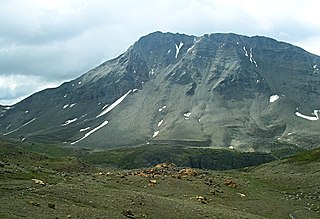
Curator Mountain is a 2,624-metre (8,609-foot) mountain summit located in the Maligne Range of Jasper National Park, in the Canadian Rockies of Alberta, Canada. Curator Mountain was so named on account of its central location, as if it were the "custodian" of Shovel Pass. The mountain was named in 1916 by Morrison P. Bridgland (1878-1948), a Dominion Land Surveyor who named many peaks in Jasper Park and the Canadian Rockies. The mountain's name was officially adopted in 1947 when approved by the Geographical Names Board of Canada. Its nearest higher peak is Trowel Peak, 7.7 km (4.8 mi) to the southeast. Curator Mountain is composed of sedimentary rock laid down during the Cambrian period and pushed east and over the top of younger rock during the Laramide orogeny.

Grisette Mountain is a 2,620-metre (8,600 ft) mountain summit located in Jasper National Park in Alberta, Canada. It is located in the Colin Range, which is a sub-range of the Canadian Rockies. The peak is situated 14 km (8.7 mi) northeast of the municipality of Jasper, and is a prominent landmark in the Athabasca Valley visible from Highway 16 and the Canadian. Its nearest higher peak is Mount Dromore, 2.4 km (1.5 mi) to the east.

Samson Peak is a 3,081-metre (10,108 ft) mountain summit located on the eastern shore of Maligne Lake in Jasper National Park, in the Canadian Rockies of Alberta, Canada. The nearest higher peak is Mount Charlton, 7.26 km (4.51 mi) to the east. Samson Peak is situated 1.72 km south of Leah Peak in the Queen Elizabeth Ranges.
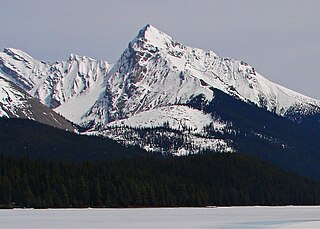
Leah Peak is a 2,801-metre (9,190 ft) mountain summit located on the eastern shore of Maligne Lake in Jasper National Park, in the Canadian Rockies of Alberta, Canada. The nearest higher peak is Samson Peak, 1.72 km (1.07 mi) to the north.

Monkhead is a 3,250-metre (10,660-foot) mountain summit located at the south end of Maligne Lake in Jasper National Park, in the Canadian Rockies of Alberta, Canada. Monkhead was named by the Alpine Club of Canada for its hood-like appearance similar to a monk. Its nearest higher peak is Mount Warren, 2.3 kilometres to the south-southeast.
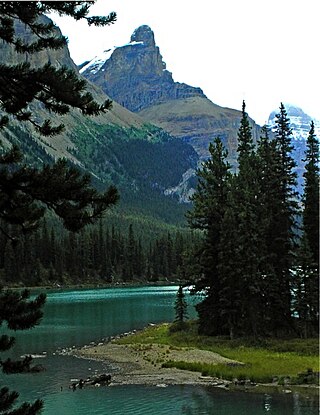
Mount Paul is a 2,850-metre (9,350 ft) mountain summit towering 1134 metres above the east shore of Maligne Lake in Jasper National Park, in the Canadian Rockies of Alberta, Canada. The nearest higher peak is Maligne Mountain, 1.81 km (1.12 mi) to the north-northwest. Mount Paul is situated north of Monkhead and they are often seen together in the background of iconic calendar photos of Spirit Island and Maligne Lake.

Geraldine Peak is a 2,930-metre (9,610-foot) mountain summit located in the Athabasca River valley of Jasper National Park, in the Canadian Rockies of Alberta, Canada. The peak is also known as Whirlpool Mountain, and Mount Geraldine. No name has been officially adopted yet. The names derive from its position at the northern end of the long ridge that divides Geraldine Lakes and Geraldine Creek on the southeast side, from the Whirlpool River on the northwest side. The nearest higher peak is Mount Fryatt, 7.0 km (4.3 mi) to the south-southeast. Geraldine Peak can be seen from the Icefields Parkway in the vicinity of Athabasca Falls.
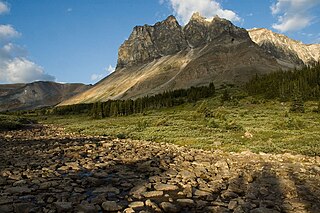
Mount Tekarra is a 2,694-metre (8,839-foot) mountain summit located in the Athabasca River valley of Jasper National Park, in the Canadian Rockies of Alberta, Canada. It is situated at the northwest end of the Maligne Range and is visible from Jasper and the Icefields Parkway. The nearest higher neighbor is The Watchtower, 7.0 km (4.3 mi) to the east.

Maligne Mountain is a 3,200-metre (10,500-foot) multi-peak massif located east of Maligne Lake in Jasper National Park, in the Canadian Rockies of Alberta, Canada. Maligne Mountain is surrounded by glaciers, and its nearest higher peak is Monkhead, 7.8 km (4.8 mi) to the south.

Opal Peak is a 2,840-metre (9,320-foot) mountain summit located northeast of the northern end of Maligne Lake in Jasper National Park, in the Canadian Rockies of Alberta, Canada. It is situated in the Opal Hills, west of Opal Lake and 5.44 km (3.38 mi) northwest of Leah Peak.

Hawk Mountain is a 2,553-metre (8,376-foot) mountain summit located in Jasper National Park in Alberta, Canada. It is located near the northwest end of the Colin Range, which is a sub-range of the Canadian Rockies. The peak is situated 16 km (9.9 mi) northeast of the municipality of Jasper, and is a prominent landmark in the Athabasca Valley visible from Highway 16 and the Canadian. Its nearest higher peak is Mount Colin, 2.4 km (1.5 mi) to the southeast. Hawk Mountain was named in 1916 by Morrison P. Bridgland for the fact that a hawk was flying near the summit at the time it was named. Bridgland (1878-1948) was a Dominion Land Surveyor who named many peaks in Jasper Park and the Canadian Rockies. The mountain's name was officially adopted in 1956 by the Geographical Names Board of Canada.

The Whistlers is a 2,470-metre (8,100-foot) mountain summit located in Jasper National Park, in the Trident Range of the Canadian Rockies of Alberta, Canada. The municipality of Jasper is situated 7 kilometres to the northeast. The nearest higher neighbor is Indian Peak, 2.5 km (1.6 mi) to the southwest. The highest and longest aerial tramway in Canada ascends to a lookout at 2,277 meters elevation, still 193 meters below the summit, but a hiking trail continues to the summit. Some of the mountains that can be seen from the top include Mount Robson, Mount Bridgland, Monarch Mountain, Cairngorm, Pyramid Mountain, Hawk Mountain, Mount Colin, Grisette Mountain, Mount Tekarra, Mount Hardisty, Mount Kerkeslin, Marmot Mountain, Terminal Mountain, and Manx Peak.

The Watchtower is a 2,791-metre (9,157 ft) mountain summit located in the Maligne River valley of Jasper National Park, in the Canadian Rockies of Alberta, Canada. It is situated in the Maligne Range and is visible from the Maligne Lake Road where it towers over Medicine Lake. Its nearest higher peak is Sirdar Mountain, 11.64 km (7.23 mi) to the north.
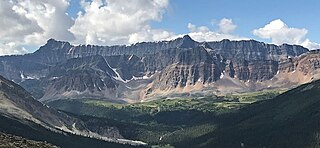
Evelyn Peak is a 2,855 m (9,367 ft) mountain summit in the Athabasca River valley of Jasper National Park, in the Canadian Rockies of Alberta, Canada. THe nearest higher peak is Mount Kerkeslin, 5.0 km (3.1 mi) to the southwest, and Mount Hardisty is 6.0 km (3.7 mi) to the northwest. All three are part of the Maligne Range. Evelyn Peak is composed of sedimentary rock laid down during the Cambrian period and pushed east and over the top of younger rock during the Laramide orogeny. The mountain is at the headwaters of Evelyn Creek, and three kilometres south of Evelyn Pass. The creek and pass were named in 1921 for Evelyn Cavendish, Duchess of Devonshire (1870–1960), who visited nearby Maligne Lake in 1920. The mountain's name however, has not yet been officially adopted by the Geographical Names Board of Canada.

Mount Erebus is a 3,112-metre (10,210-foot) mountain summit located near the Tonquin Valley of Jasper National Park in Alberta, Canada. Mount Erebus is composed of sedimentary rock laid down during the Cambrian period, then was pushed east and over the top of younger rock during the Laramide orogeny. Its nearest higher peak is Mount Fraser, 4.0 km (2.5 mi) to the northwest. The Continental Divide lies 3 km (1.9 mi) to the west, Angle Peak is situated 4.5 km (2.8 mi) to the southeast, and The Ramparts are 5.0 km (3.1 mi) to the north. The mountain's north ridge terminates at Outpost Peak.

Indian Ridge is a 2,820-metre (9,252 ft) mountain located in Jasper National Park, in the Trident Range of the Canadian Rockies of Alberta, Canada. The summit is unofficially called Indian Peak. The town of Jasper is situated 9 kilometres (5.6 mi) to the north-northeast, The Whistlers lies 2.55 kilometres (1.58 mi) to the northeast, and Muhigan Mountain is 4.8 kilometres (3.0 mi) to the west-northwest. The nearest higher peak is Manx Peak, 4.3 km (2.7 mi) to the southwest, and Terminal Mountain lies 3.25 km (2.02 mi) to the south. The Marmot Basin alpine ski area on Marmot Mountain is located 4 kilometres (2.5 mi) to the southeast. The peak is composed of sedimentary rock laid down from the Precambrian to the Jurassic periods and pushed east and over the top of younger rock during the Laramide orogeny.

Cairngorm is a 2,610-metre (8,563 ft) mountain located in Alberta, Canada.






















